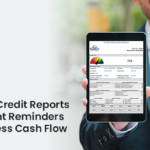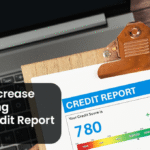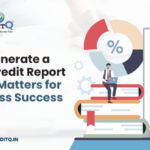Whenever you apply for a credit or loan, you receive inquiries from the financial institutions regarding your credit report. This is done to access the information about your credit management system, payment settlement history, and the transactions made.
It builds the lender’s understanding of your credit behavior based on which they decide whether to extend the loan to you or not. There are 3 most popular and trustworthy credit bureaus which provide your business credit report and these are CreditQ, Experian. Even you can access your credit report and look for any possible errors.
This allows you to conduct a credit health check. If you want to know what exactly this credit report includes then you are at the right spot. This blog outlines the meaning and components of a credit bureau report.
What does a credit bureau report mean?
The credit bureau report is a comprehensive summary of your entire credit history and payment transactions. It includes all your outstanding debts and is generally measured by a credit information company like CreditQ, Equifax, etc. These institutions are authorized to carry out business credit operations by the financial regulatory bodies. It works as an important parameter for lenders or creditors to decide whether to accept your loan demand or not.
Components of a credit bureau report
The credit report layout a variety of information about your business credit dealings so that lenders can conduct an accurate assessment of your credit repayment behavior. Let’s look into each of them in detail.
1. Information related to identification
This section of your credit report includes basic information which is used to identify you as a valid profile. The information is verified and is necessary to prove your authentication so make sure you fill in the correct business details. Entries required are your GSTIN, name, address, social security number, contact details, PAN card number, and Aadhar number to name a few. All these particulars are used to personalize your account and do not impact your credit score in any way.
2. Information about your credit account
This information is extremely important and is reported by your previous or current lenders or creditors. This basically describes the type of credit account to define the purpose it was taken for like student loan account, credit card, vehicle loan, etc. It also requires you to mention the date on which that account was opened, your credit limit, or the balance available in your account. It contains some figures regarding your debt repayment history which plays a huge role in deciding your business credit score. However, the closed accounts are excluded here.
3. Number of credit inquiries made
The credit inquiries are recorded within their system each time any lender or financial institution requests your credit score. Such inquiries are called hard inquiries and a large number can have an impact on your credit score. And when you request your business credit report for reference purposes it is termed as soft inquires. These soft ones don’t alter your business credit score and the credit report have a good combination of both of these figures. Lenders wish to check at least your past 2 years of inquiries to make the decision based on their financial risk management.
4. Details of your collection accounts
If you default the debt settlement or your accounts get overdue then it is transferred to the collection agency. It can also be sold to a debt buyer and incorporates all kinds of accounts like credit card bills, retail store bills, hospital charges, etc. It can impact your credit score so it’s better to work on your late payment solutions.
5. Bankruptcy cases
Your credit bureau report also lists any possible bankruptcy cases that can cause serious damage to your business credit score. As per the laws, these cases or public records stay on your credit profile for at least 7 years. Make sure you carve out proper B2B solutions and streamline your business operations to avoid such bankruptcy instances.







